Tidbits – Sept. 5 – Reader Comments: 2024 Elections – Public Schools, Action on Corporate Power, High Prices, Inflation; Israel-Gaza: A Way out of This Mess – Please Take It; Learning About Unions, Public Employees Pay Gap; Remembering Paul Mishler;

-
Re: The Harris-Walz Vision for Public Schools (Wendy Anes Hirschegger)
-
Why Are Things Expensive -- Meme
-
Re: Polling Shows Voters Want To See Action on Corporate Power (Joe Gray)
-
Re: Are Democrats Actually Listening to Jesse Jackson? (Marshall Mayer)
-
Meet the Candidates -- Cartoon by Mike Stanfill
-
Re: Israel Will Collapse Within a Year if the War of Attrition Against Hamas and Hezbollah Continues (Mary-Alice Strom)
-
Re: There Is a Way out of This Mess, Joe and Kamala. Please Take It. (Bill Rogers)
-
Deadly Mosquito -- Cartoon by Rob Rogers
-
Re: COVID-19, Flu and RSV Shots - an Epidemiologist Explains Why All Three Matter This Fall (Daniel Millstone)
-
Gestapo Tactics -- Cartoon by Nick Anderson
-
Re: Laughter (John Jonik)
-
Re: America’s War on Theater (Phil Olenick)
-
This Labor Day, Thank the Farmworkers For the Food We Eat -- Cartoon by Lalo Alcaraz
-
Learning About Unions -- Meme
.
Resources:
- Unions Helped Narrow Growing Pay Gap For State And Local Government Employees (Economic Policy Institute)
.
Announcements:
-
50th Anniversary of the New International Economic Order -- September 12 -- New York City (Progressive International)
.
.
Re: The Harris-Walz Vision for Public Schools
Their agenda breaks with decades of Democratic thinking about education. The Harris-Walz education agenda is often inseparable from the campaign’s economic priorities. Both are part of what the candidates describe as a pro-family platform.
The contrast with the goals of a second Trump administration couldn’t be starker. Eliminating the Department of Education—a GOP talking point for decades and a regular Trump promise on the campaign trail—would result in deep cuts to federal funding for under-resourced schools. Project 2025, the Heritage Foundation’s detailed policy blueprint for a conservative transformation of government, calls for a host of policy changes that would make education more expensive for families, including eliminating Head Start, shrinking the federal school meals program, and the eventual dismantling of public education.
The emerging Harris-Walz education agenda, with its emphasis on supporting families outside of school, also breaks with decades of Democratic thinking about education. Since Bill Clinton, as inequality deepened and wages stagnated, Democrats pointed to public schools, and especially their teachers, as the problem, and competition and privatization as the solution.
Wendy Anes Hirschegger
Posted on Portside's Facebook page
Why Are Things Expensive -- Meme
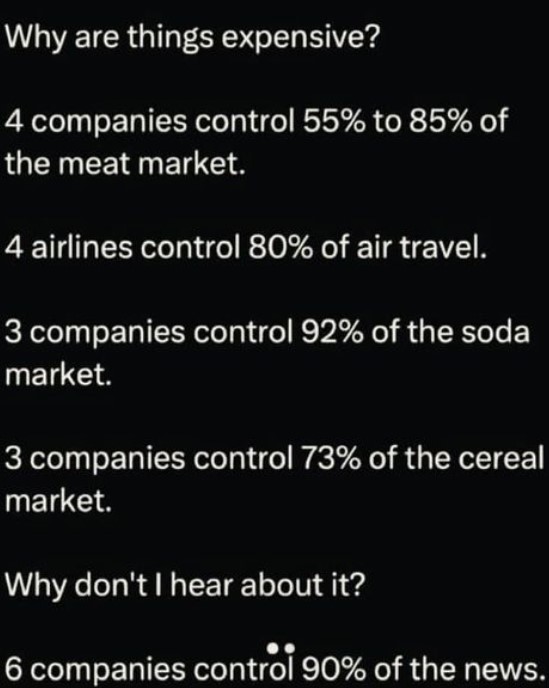
Re: Polling Shows Voters Want To See Action on Corporate Power
“The most notable finding is that when provided with a set of options, 61 percent of the polling respondents, including two-thirds of Democrats and 63 percent of independents, selected corporate greed as the main cause for rising costs they’re experiencing. The second-highest is government spending at 51 percent—an explanation certainly favored by Republicans—and behind that is the pandemic supply chain crunch at 46 percent.”
Joe Gray
Posted on Portside's Facebook page
Re: Are Democrats Actually Listening to Jesse Jackson?
Party leaders pay tribute to civil rights icon, but they don’t always practice what he preached.
In Annapolis, the few legislators who most vocally embrace Jackson’s most radical positions and tactics — on economic equality, on making the rich and corporations pay their fair share, on Palestinian statehood, on tenants’ rights, on workers’ rights, on Medicare-for-all, on aggressive climate action — are often marginalized, if not outright ostracized.
As U.S. Rep. Ro Khanna (D-Calif.), a forceful progressive despite representing Silicon Valley, said in Chicago, “We can’t celebrate Rev. Jackson without listening to what Rev. Jackson is calling on us to do.”
Marshall Mayer
Posted on Portside's Facebook page
Meet the Candidates -- Cartoon by Mike Stanfill
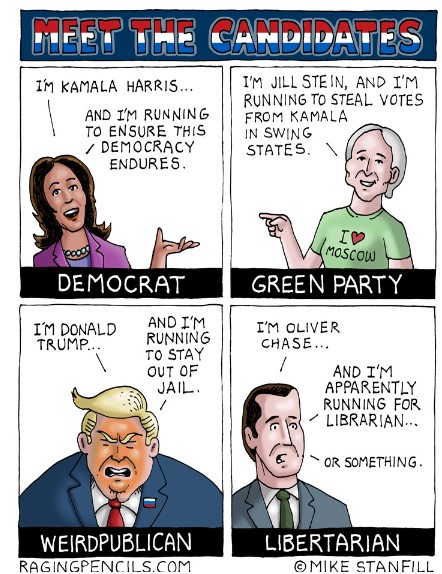
Mike Stanfill
September 4, 2024
Raging Pencils
Re: Israel Will Collapse Within a Year if the War of Attrition Against Hamas and Hezbollah Continues
What Israel could have achieved earlier with a hostage/cease-fire agreement has become impossible due to the new conditions that Netanyahu introduced into the proposed deal. Those involved in the negotiations in Doha claim that they have no maneuvering space to negotiate because their hands are tied.
All of the paths chosen by Israel's political and military leadership are leading the country down a slippery slope. One dictator controls the fate of the country, and a flock of sheep follows him blindly.
Mary-Alice Strom
Posted on Portside's Facebook page
Re: There Is a Way out of This Mess, Joe and Kamala. Please Take It.
"A long-overdue cut-off of U.S. arms to Israel and recognition of the Palestinian right to self-determination would provide exactly the shock to the system that is needed."
Indeed, but I'm not holding my breath.
Bill Rogers
Posted on Portside's Facebook page
Deadly Mosquito -- Cartoon by Rob Rogers
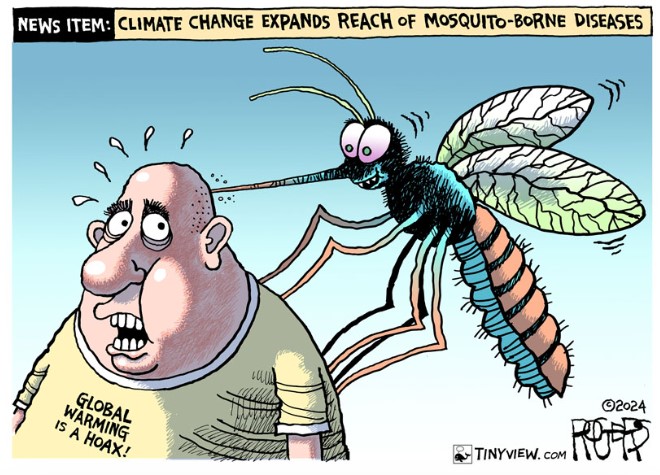
The rising cases of mosquito-borne diseases in the U.S. like West Nile virus and Eastern equine encephalitis are frightening. Yet another reason to take climate change seriously.
Rob Rogers
September 3, 2024
TinyView
Re: COVID-19, Flu and RSV Shots - an Epidemiologist Explains Why All Three Matter This Fall
I plan to get my Flu and Covid vaccine shots next week. I was a test subject for the RSV study and, because I got the study vaccine, I won’t get an RSV inoculation this year. Thanks to this Portside report.
Daniel Millstone
Post on Facebook
Gestapo Tactics -- Cartoon by Nick Anderson
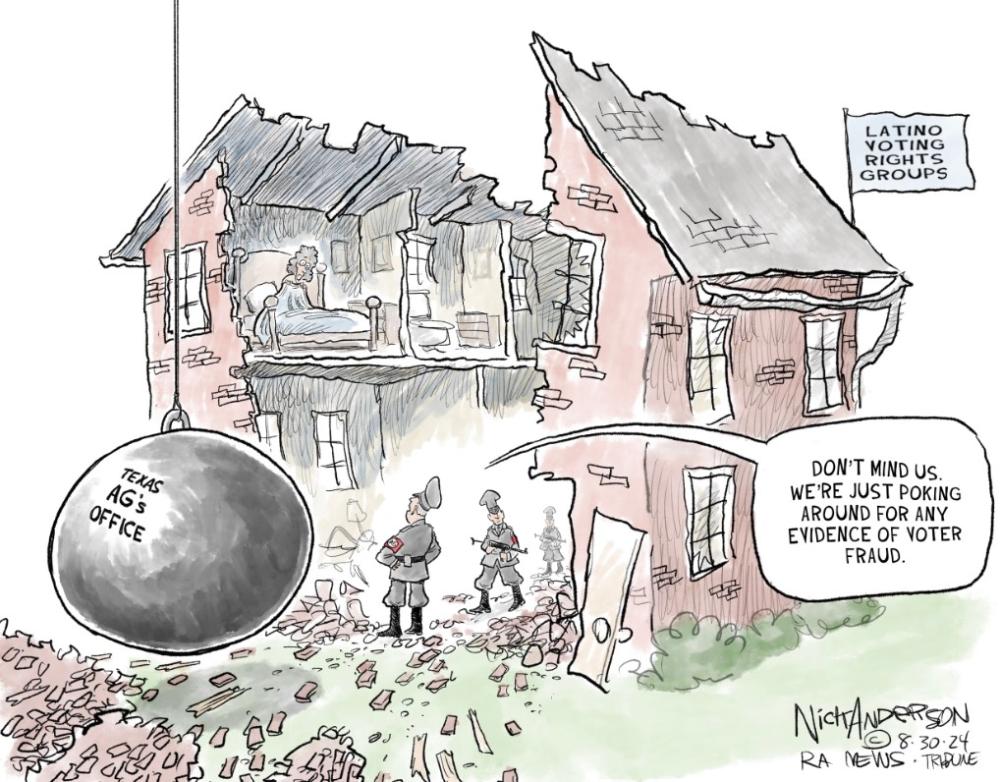
A Latino voting rights group called Monday for a federal investigation after its volunteers said Texas authorities raided their homes and seized phones and computers as part of an investigation by the state’s Republican attorney general into allegations of voter fraud.
Nick Anderson
August 30, 2024
Pen Strokes
(posting on Portside Culture)
Hmmm...a lot of laughter these days is out of total cruelty...sexism, racism, etc etc. Just watch, and notice laughing at the "jokes" at a Trump rally or the like. Oy
John Jonik
(posting on Portside Culture)
No mention of The Cradle Will Rock? Not only was it the most famous of the shows they closed down, the recent film (with the same name) expanded its focus to show the hearing described in the article and the era it was set in, underlining that its was talking about the real world.
Phil Olenick
This Labor Day, Thank the Farmworkers For the Food We Eat -- Cartoon by Lalo Alcaraz
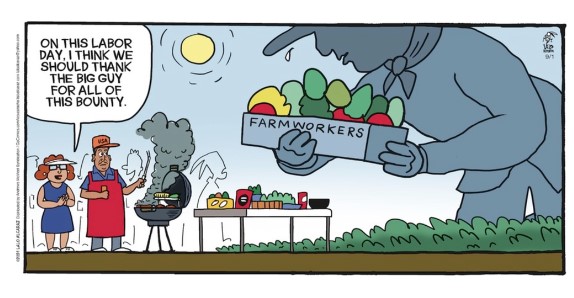
Lalo Alcaraz
September 2, 2024
https://www.pocho.com
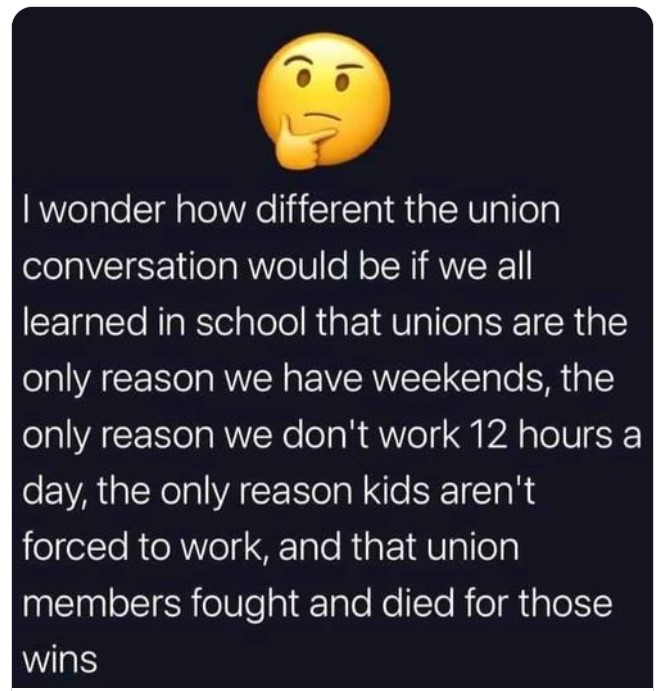
Unions made the difference: How collective bargaining helps narrow a widening pay gap between public- and private-sector workers

|
|||||||||||
|
Summary: Public-sector employees earn less than their private-sector counterparts, and that pay gap has widened in recent years. The pay gap is narrower in states where public employees have stronger collective bargaining rights.
Key findings
-
Nationally, the public-sector pay gap has widened in the last four years.
-
State and local government employees earned, on average, 17.6% less than similarly educated private-sector employees, compared with a pre-pandemic pay gap of 13.9%.
-
Even when factoring in more robust public-sector benefits packages, total compensation is approximately 14.5% lower for public-sector workers than for private-sector workers.
-
Collective bargaining rights for public employees vary widely across states, and this has an effect on pay gaps between public- and private-sector workers. When compared with private-sector workers, public-sector workers with strong bargaining rights (-14.9%) have a narrower pay gap than those with weak (-20.1%) or no bargaining rights (-22.9%).
Why this matters
State and local governments are facing acute and growing staffing shortages as public-sector pay lags farther behind the pay of private-sector workers. Moreover, the public-sector pay gap disproportionately affects women and Black workers, who are more likely to be employed in public-sector jobs and who are disadvantaged in the broader labor market. Strengthening collective bargaining rights for government workers would narrow the pay gap and reduce racial and gender inequality.
How to fix it
At the national level, Congress should pass the Public Service Freedom to Negotiate Act to ensure that state and local government workers across the country have the right to bargain collectively over pay and working conditions. This is particularly important since public employees have been excluded from federal labor law, leaving little consistency in their rights across states. At the state level, policymakers should ensure that all state and local government workers have collective bargaining rights at least equivalent to those guaranteed to private-sector workers under federal law.
Read the Full Report
This is a revised and expanded version of a report published in March 2022.
Economic Policy Institute
1225 Eye St. NW, Suite 600
Washington, DC 20005
Phone: 202-775-8810 • epi@epi.org

On September 12, the Progressive International is returning to New York City for a special evening of debate and discussion with some of the world’s leading thinkers — Isabella Weber, Adam Tooze, Branko Milanovic, Jayati Ghosh, Olúfẹ́mi O. Táíwò and more — and we hope to see you there!
REGISTER NOW FOR THE NIEO 50TH ANNIVERSARY CELEBRATION
The event marks the 50th anniversary of the New International Economic Order, when the nations of the Global South came together to propose a vision for full decolonization — and won the 1974 UN Declaration for its establishment at the General Assembly.
Today, we are again in a moment of rapid geopolitical transformation — but we lack a common vision for the world’s most pressing challenges. How will we confront the crises of climate change, viral pandemic, and extreme poverty that threaten billions across the planet?
Over the past two years — from Brussels to Havana and beyond — the Progressive International has convened scholars, diplomats, and policymakers in a series of conferences and congresses to develop the answers to those questions in a new NIEO Program of Action.
Now, we are planning the launch of that Program of Action in a special ceremony at the New York Society of Ethical Culture — and we would be honored to welcome you there alongside the incredible cast of world-leading political economists.

This event is free and open to the public, so we encourage you to invite friends, colleagues, and comrades along for a vibrant evening of debate and discussion. Together, we will be there to welcome you all and mark this historic occasion at the start of this year’s UN General Assembly.
Remembering Paul Mishler: Activist, historian, mentor, comrade
Paul's research focused on left-wing social movements and the ways radicals attempt to transmit their values to future generations
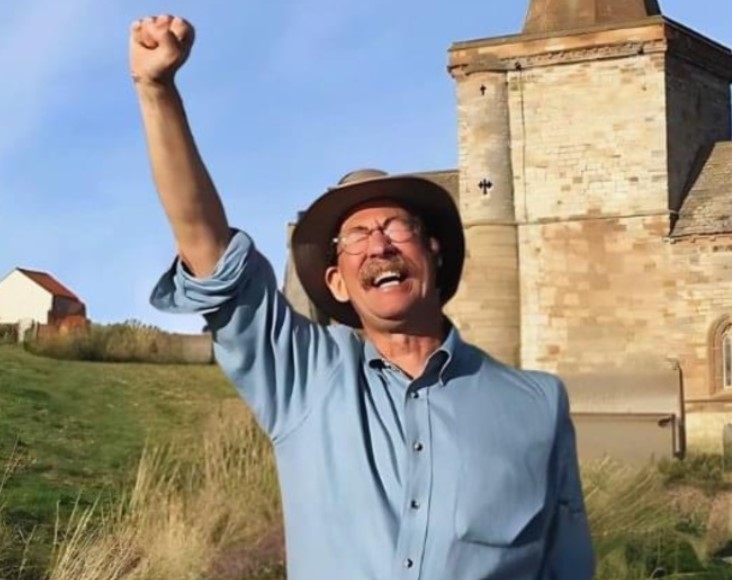
Paul Chaim Mishler died on August 25, 2024, at the age of 71, after a long battle with cancer, complicated by other health issues. His beloved wife, Gerrie Casey, and their beloved son, Max Mishler, were at his side. Paul was a brilliant activist, historian, professor, and mentor, a loving husband, father, grandfather, brother, uncle, cousin, and a friend and comrade to many.
Paul earned his Ph.D. in History from Boston University (1988) and his BA from the University of Massachusetts, Amherst (1975). He was an Associate Professor Emeritus of Labor Studies at Indiana University at South Bend.
Paul leaves behind his wife Gerrie Casey, with whom he shared a life since they were in high school, son Max Mishler, daughter-in-law Shauna Sweeney, and grandson Maceo (the apple of his eye), brother Mark Mishler and sister-in-law Renee Hariton, sisters-in-law Freddie Gillespie (Richard) and Doreen Casey (Glen), nephews Raphael Mishler and Nikolai Mishler, step-mother Vicky Steinitz, step-sisters Rebecca Steinitz (Sam), Sarah Steinitz (Charlie), and their children Mara, Eli, Eva, and Liana.
Paul was a dedicated organizer for social justice his entire life. He was deeply involved in the labor and anti-racist movements, as well as peace movements and in solidarity with people struggling for justice around the world. Paul brought strategic thinking, humor, commitment, and a deep belief in the power and value of people working together to achieve justice. Paul’s parents, Elliot and Anita Mishler, were radicals and intellectuals who taught Paul and Mark that the world is out there to be changed and that there is a lot of work to be done.
Paul’s research focused on left-wing social movements and the ways radicals attempt to transmit their values to their children. His first book, Raising Reds – The Young Pioneers, Radical Summer Camps, and Communist Political Culture in the United States (Columbia University Press, 1999), explored the children-based activities of the Communist Party from the 1930s – ’50s. His most recent work, an edited volume, is Philip Foner, Marxist Historian (International Publishers, 2024.)
Paul believed a better world is possible, one based on human needs rather than greed. This was grounded in his life-long belief in socialism. He recognized the path to a more just world was neither easy nor clear. In the final paragraph of Raising Reds, in 1999, Paul noted that while the vision of a just world may have proven, so far, to “have been more of a dream than a practical possibility”, “visions, unlike strategies, cannot fail. They can only be forgotten”. The goal of his work was “to remember the dream so that it may enrich our current political reality–dismal as it may seem now.”.
Paul was an extraordinary teacher and mentor to many students and younger scholars, always making clear his respect for their experiences and knowledge. Many former students and mentees have shared the transformational impact Paul had on their studies, careers, and work.
Paul loved folk music and had remarkable expertise in the history of political music from around the world. He approached the world with humor. He was upbeat through many years of medical difficulties. Until the end, Paul was much more interested in speaking with friends and relatives about their work and activism, in particular the ongoing Palestinian solidarity movement, than talking about his own serious health issues.
The family profoundly thanks Paul’s amazing South Bend friends, Rebecca Torstrick, Jeff Sutter, April Lidensky, Carol Stuart, Jorden Giger, Spencer French, Kay Westhues, Marsha Heck, Lisa Cunningham, and Lee Gloster, all of whom provided extraordinary love, care, and assistance to Paul and Gerrie during Paul’s last months. East-coast family members repeatedly mobilized for Paul, including Paul’s cousin Kathy Lessuck, Mark, Renee, Raphael, and Nikolai. The family deeply appreciates assistance provided by the Center for Hospice Care, and Henrietta Cobbin.
If you choose to make a donation in Paul’s memory, please consider contributing to Jewish Voice for Peace, an organization close to Paul’s heart. Paul was an active member for many years, helping JVP build a community of activists determined to ending U.S. complicity in Israel’s genocidal treatment of the Palestinian people. https://www.jewishvoiceforpeace.org/contribute/?sourceid=1002270 . Please send an email to info@jvp.org stating that the donation is in honor of Paul C. Mishler so they can notify Paul’s family of your contribution.
